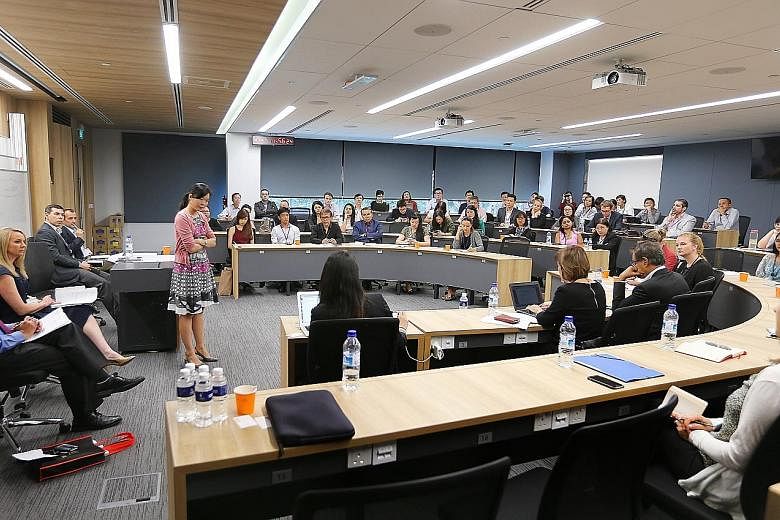A regional group of news organisations in Asia will work together to help its reporters and readers identify fake news.
They plan to draw up a checklist which will help their staff as well as readers spot tell-tale signs of stories with dubious content. They will also compile a list of known sites that regularly spread such false information.
Group members will call on each other to cross-check stories reporting on their respective countries which appear dubious so as to tap local knowledge. They will also share stories or content they produce debunking fake stories.
These are among a number of immediate steps that the Asia News Network (ANN) - a regional alliance of 22 media organisations - is planning to implement, The Straits Times (ST) editor Warren Fernandez said yesterday. He is a board member of the group, of which ST is a member.
He outlined the action plan at the end of a two-day conference on fake news that brought together almost 200 leading news executives, tech experts and policymakers. The event at Singapore Management University was organised by ST and the World Association of Newspapers and News Publishers (Wan-Ifra).
Among the more than 20 outcomes produced from three discussion groups yesterday was a proposal that ANN members form special project teams to cross-check information on issues of common concern such as terrorism, the environment or the South China Sea.
-
Unsure about a story? Ask ST
-
Come across a report or video that you think might be fake? Ask ST, and it will help you to pin it down.
The Straits Times is pitching in to help its readers distinguish between true and false reports by opening up its popular AskST platform for readers to send in queries about reports, photos or videos they find dubious.
ST reporters will then work to establish if the report is true or false.
Readers can also alert the newsroom to content they have determined to be false by sending it to the AskST site, for the paper to consider whether to publish their findings.
These are among the steps The Straits Times will undertake as part of its efforts to counter fake news, said its editor Warren Fernandez.
It may also feature reports debunking misinformation on health issues in its Mind & Body pages, he said, to help readers make sense of the many stories on healthcare products and practices they receive through social media.
The ST digital team will look into producing videos featuring its social media editors pointing out fake news reports, he added.
The ST newsroom will also work with local media schools and its regional partners in Asia to tackle fake news.
Mr Fernandez said: "Readers are tired of being taken for a ride by fake news sites and reports. As a responsible news organisation, we will do our part to help debunk false reports."
But even as they pursued these initiatives, Mr Fernandez said news organisations must not lose sight of their core mission: Providing reliable and responsible news against the onslaught of fake news. That was the best way to earn and keep their readers' trust, he said.
"Trust is something we have to earn all the time and not to be taken for granted, in the light of the very real threats the media is up against."
He welcomed a suggestion from a forum participant that news organisations should be more proactive in calling out questionable content. One way to do so was for newsrooms to collaborate among themselves, as well as with journalism schools in universities, the participant had noted.
Associate Professor Eugene Tan from Singapore Management University's School of Law raised the possibility of countries setting up independent regulatory bodies, rather than relying on government regulation or legislation to counter fake news sites and reports.
While it is the norm for the authorities to regulate, "the concern is that governments themselves, for a variety of reasons... do generate fake news as well''.
He added: "You can't have the Government being the judge and the jury." He said laws should seek to cultivate "good journalism" and "good media behaviour" as well.
Lecturer Anne Kruger of Hong Kong University, who spoke on media and news literacy, wants the young to be taught in school the ways to spot and deal with fake news. The elderly, too, need such lessons, she added.
While ambassadors and role models can help raise their awareness of fake news, the mobile phone, a favourite device of the elderly, can be more effective in curbing the spread of unverified information.
"They go from analog, straight to mobile... and that is why they spread everything through WhatsApp," Ms Kruger said of how rumours are spread among older people.
Methods to curb this have got to be on the mobile phone, or at least help them "get to the point where they will pause for seven seconds and not share it", she added.
Editors told The Straits Times the conference has given them a better insight into the challenges posed by false information.
"My immediate priority will be to focus on collaboration with the Asia News Network to combat fake news," said the editor and publisher of The Daily Star in Bangladesh, Mr Mahfuz Anam.
Mr Gilles Demptos, Asia director of Wan-Ifra, said a key conclusion is that "a multi-stakeholders approach involving tech companies, social media networks, news media, government agencies and civil society is needed to effectively fight misinformation".
The Philippine Daily Inquirer's associate editor John Nery said fake news is an old problem with new elements arising from technological advances and a more polarised political environment.
"But we should not succumb to moral panic," he said, as there are tools to uncover the falsehoods, and organisations are moving to do so.


